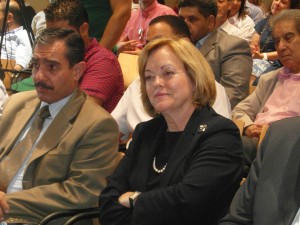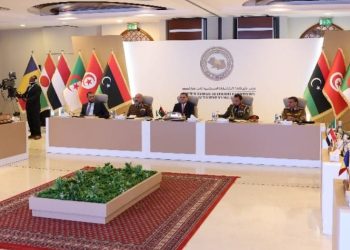By Libya Herald reporters.

Tunis, 17 September 2015:
One of the saddest decisions she had ever had to make in her career, confessed . . .[restrict]outgoing US ambassador, Deborah Jones, was when she concluded in July 2014 that the American embassy in Tripoli had to be closed down.
“Ultimately, it was my decision” she told the Libya Herald, in a valedictory interview,”However, it came about as a result of close collaboration and consultation with Washington”.
It was a tough call, she said because the US mission ideally needed to stay close to Libyans. “But the embassy came under fire as a result of two warring militia fighting on each side of the compound, lobbing missiles at each other, and we were caught in the middle. The risk was simply too great and withdrawal was the right decision”.
It was a wrenching break in an increasingly challenging assignment which Jones recalled had begun in May 2013 with high hopes.
“Our whole mission,” she said, “was motivated to ensure that our colleagues’ sacrifices in the Benghazi tragedy were not in vain. Our ‘mission statement,’ as developed by my staff, was to help Libyans develop an environment in which they could ‘Live, Work and Love with Dignity”… Toward this end, we hoped to strengthen Libyan institutions, and specifically to build a neutral, national General Purpose force that would provide a stable security framework in which Libyans could build those institutions and go about the business of governance – establishing rule of law and the regulatory framework needed for Libyans to live and work with dignity”.
Jones was widely criticised, along with her then British opposite number Michael Aron, for seeming to go out of her way to talk to members of the Muslim Brotherhood and other Islamists. It is criticism that she still rejects hotly.
“As ambassadors our jobs are to meet elected officials, government officials and members of political parties, which is exactly what I did during my tenure as ambassador to Libya. My job was to find the means to engage all Libyans in a political dialogue that allowed the country to progress”.
She went on to assert: “All that engagement laid the groundwork for the UN-sponsored dialogue that has come to fruition with Special Representative to the UN Secretary General Bernardino Leon.
Jones also took flack on the Twitter account she opened, which attracted such vituperative posts that this March she signed out for the last time with a dignified ‘Masalaamah’. But she insisted that she had no regrets about running the account.
“It is never a mistake to open as many channels of communication as you can,” she said, “especially in Libya where social media is a primary way of communicating. We all deal with trolls and negativity on social media. It is part of the fabric of the technology these days. I had tens of thousands of followers, but it got to the point where a relatively few but outspoken, vulgar and violent individuals were latching onto anything I said to distract negatively from the good work of our mission and UNSMIL.
“That said, I would absolutely do it again. Trying to bring Libyans into an open and transparent conversation on what is going on in their country and what the US is doing is important. The vast majority of Libyan followers had very positive comments and I learned a lot about the country”.
Jones said she was also proud of a range of achievements. In her first six months as envoy, the US had managed to complete the chemical weapons clean-up, had signed and launched a range of agreements covering culture, trade and investment, higher education, legal assistance and municipal advice. It has also begun programme to establish the General Purpose Force, a $600 million Pentagon project that would have trained and equipped up to 8,000 Libyan soldiers. She also pointed to the US role in intercepting the illegal oil shipment being carried by the tanker Morning Glory in March 2014.
“All of these initiatives and agreements demonstrate the sustained and exerted commitment of the United States toward Libya from Day One of my tenure as ambassador,” she said, “We work closely and collaboratively with the UN and I have personally attended almost every session of the UN sponsored talks, often together with our Special Envoy to Libya, Jonathan Winer”. She added she had also undertaken “many engagements below the radar with governments and individuals in support of that process. So in sum, U.S. diplomatic leadership and support for Libya is very strong”.
When American diplomats joined the general exodus of foreign missions from Tripoli in July last year, Jones and her team went to Malta while most embassies relocated to Tunis. She revealed that initially it had been hoped to go in and out of Libya from Malta via an “air bridge” but the rapid deterioration in security ruled this out.
However, she insisted that she and her people were able to do a lot of business with Libyans and Libyan institutions from Malta, which had long-established ties with Libya. “ I am grateful to the government of Malta and our embassy there for their hospitality and support. Establishing an external office in Tunis required resolving a number of logistical issues, such as accreditation, staffing and office space. We had to approach the move without disrupting the important work of embassy in Tunis – itself in the process of reconstituting staff following the September 2012 attacks – in supporting Tunisia’s important democratic transition”.
In 2013 and the start of 2014, some American businessmen were critical of the support they were getting from US diplomats, who they complained were focusing on big ticket items while European firms, the Italians in particular, were winning a large number of smaller deals.
Jones rejected the analysis saying that given the “fledgling experience” of US companies in the Libyan market, they should be given credit “for their enthusiasm and optimism despite a very challenging business environment, in competition with others who had much more experience on the ground in Libya. Given the very large domestic market in the US, it’s not surprising that most US companies abroad are primarily interested in large scale projects where the profit potential is fairly significant. US companies excel at large scale projects and this expertise is very marketable in places like Libya where these projects can make a huge difference in such fields as telecommunications, energy and infrastructure”.
Looking back on the highest and lowest points of her tenure Jones says three of them came on the very same day: ‘This was the raising of the American flag over the newly-completed interim embassy compound on 26 June, the days of the elections but at the same time, the day that my friend and one of Libya’s great patriots, Salwa Bugaighis was brutally murdered in her home”. [/restrict]









